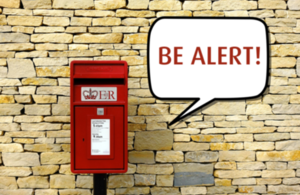Alert for charities - fundraising and postal stamp fraud
This alert provides information and advice to charity trustees, employees and volunteers about stamp fraud and the risks associated with it.

Postal stamp fraud
Stamp fraud involves the preparation, distribution and sale of previously used stamps for reuse. Usually these stamps are sold online, at a lower price than the standard postal service rate.
Anyone knowingly collecting, preparing, distributing, reusing or selling used stamps to avoid paying full postal fees may be committing a form of fraud.
How it can impact charities
A number of charities collect used stamps as a means of fundraising.
Although we do not believe that charities are knowingly profiting from the collection and sale of used stamps, some are inadvertently enabling this form of fraud by selling packages of used stamps, commonly referred to as ‘kiloware’.
The majority of these stamps are then prepared and fraudulently re-sold as if they were valid postage. The money being made by criminal gangs from this type of fraud is significant, and can be used to fund further and wider scale criminal activity.
Fundraisers may believe they are selling stamps to collectors but this is rarely the case as these stamps have little collectable value.
Charities should avoid engaging in this activity unless they are certain that the stamps collected and sold are genuinely being bought by collectors, and are not being used for fraudulent purposes.
Warning signs to look out for
Signs that a potential buyer of used stamps may not be a genuine collector include:
Requests to bulk buy
Be wary of requests from individuals to purchase UK or GB ‘kiloware’ from you in bulk. Genuine collectors tend to have their own sources of used stamps and often trade with each other – it is unlikely that they would specifically call on charities to provide loose stamps.
Requests for certain types of stamps
There is no reason for any genuine dealer to request previously used, uncancelled stamps, ‘Non Value Indicator’ stamps (do not display a price), or Christmas stamps in bulk. An uncancelled stamp is one which has been through the postal system, but hasn’t been marked as used. It is often incorrectly referred to as unfranked.
Offering to deal stamps on your behalf
Some stamp collectors may genuinely request foreign or specialist stamps but charities should consider a company or person offering to deal stamps on their behalf as a potential red flag.
All of the above examples put your organisation at risk of being unwittingly involved in a form of fraud that is potentially funding wider scale criminal activity.
How to protect your charity from stamp fraud
-
Decline requests from individuals or groups who wish to purchase used GB stamps from you directly - either through direct contact or via your online marketplace. Additionally, let Royal Mail know if you suspect that a request may not be from a genuine dealer.
-
If you are satisfied that your stamps are destined for collectors, check the type of stamps you are collecting. Foreign stamps are less likely to be fraudulently sold in the UK.
-
Consider checking that your charity name is not being used in ‘kiloware’ advertising without your permission.
-
If you buy stamps for your charity’s own use then buy them from the Post Office or any other reputable seller. Stamps are typically not sold at a discounted price.
How to report fraud
To report suspected stamp fraud, and for more information on the subject, please visit the Royal Mail website.
If your charity becomes a victim of insider fraud, or any other type of fraud, report it to Action Fraud by calling 0300 123 2040, or by visiting the Action Fraud website.
Charities affected by fraud should also report it to us as a serious incident.
Serious incident reporting helps us to assess the volume and impact of incidents within charities, and to understand the risks facing the sector as a whole. Where appropriate, we can also provide timely advice and guidance.
Notes
The Charity Commission, the independent regulator of charities in England and Wales, is issuing this alert to charities as regulatory advice under section 15(2) of the Charities Act 2011.